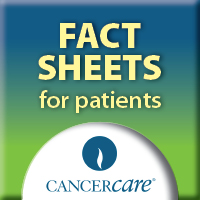A cancer diagnosis raises a wide range challenges and concerns. Fortunately, there are local and national resources to assist you with many of the issues that come up. This fact sheet describes several kinds of services available to people with cancer and their loved ones, and different ways to find the help you need.
“What Kind of Help Can I Get?”
General information Many reputable general and diagnosis-specific cancer organizations provide reliable, up-to-date information on treatment options, clinical trials, side-effect management and more.
Emotional support Cancer can make you feel lonely, scared or distressed. Counseling, support groups, patient-to-patient networks, and other kinds of support are available to help you cope with these emotions.
Financial help There are companies that help people with cancer and their families with medical billing, insurance, and reimbursement issues. There are also co-payment organizations and patient assistance programs that help individuals who cannot afford the cost of medications.
Transportation assistance Some people have trouble getting to and from medical appointments. In many communities, transportation services are available to help you.
Housing/lodging Some organizations provide lodging for families of a patientundergoing treatment, especially if the patient is a child.
Children’s services There are organizations that provide services for children with cancer or children who have a family member with cancer. These include counseling, summer camps, and “make-a-wish” programs.
Home health care Home health care is for patients who no longer need to be in the hospital, but still require skilled care at home.
Hospice services Hospice care focuses on the special needs of cancer patients who are terminally ill.
“How Do I Find These Resources?”
Often, the services you need can be found in your own neighborhood or are easily accessible. Here are some places to start with:
Your health care team Doctors, nurses and social workers can provide information about your cancer diagnosis, medical condition, pain and side-effect management, rehabilitation, home nursing, hospice care and other concerns.
Hospitals Hospital social workers and discharge planning coordinators are great resources for information about counseling, home care, transportation and child care.
Libraries Public libraries and libraries at cancer centers are excellent sources of information. Ask the librarian to help you find books or articles about your concerns.
Local shurches, synagogues, YWCAs, YMCAs, or fraternal orders Many of these places provide volunteers for transportation or home care.
Local/county government Local governments often offer low-cost transportation. Government agencies can give you information on Social Security, state disability, Medicaid, income maintenance, and food stamps.
United Way (find your local United Way at www.national.unitedway.org), Area agencies on Aging (1-800-677-1116 or www.eldercare.gov) and the American Cancer Society (1-800-227-2345 or www.cancer.org) These important agencies can guide you to resources in your local community.
The internet There is an enormous amount of information on the internet. To make sure you’re finding reliable information, ask your doctor, nurse or social worker to recommend websites.

